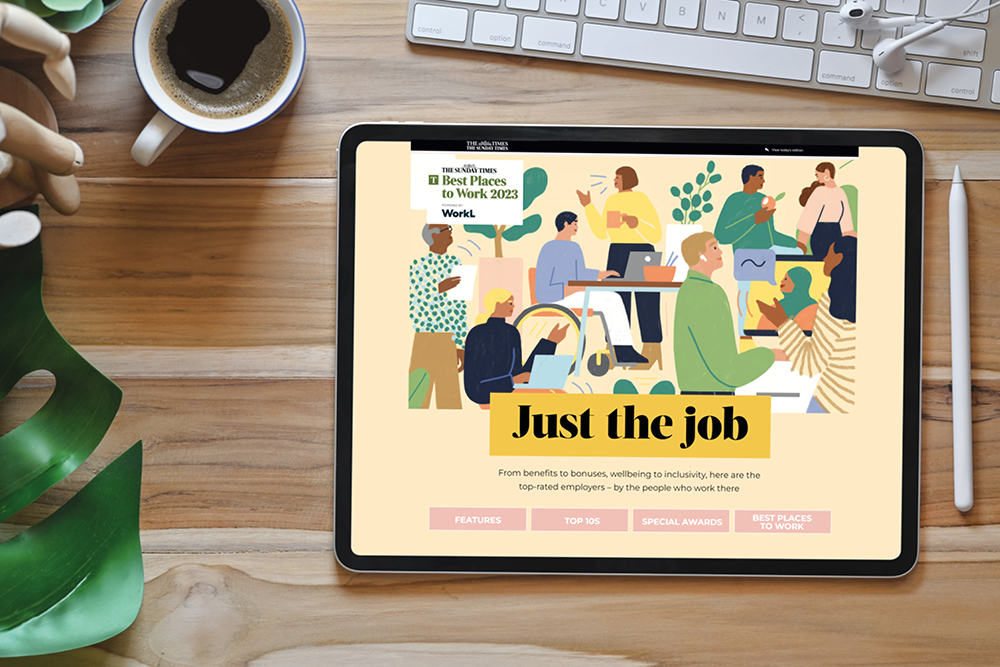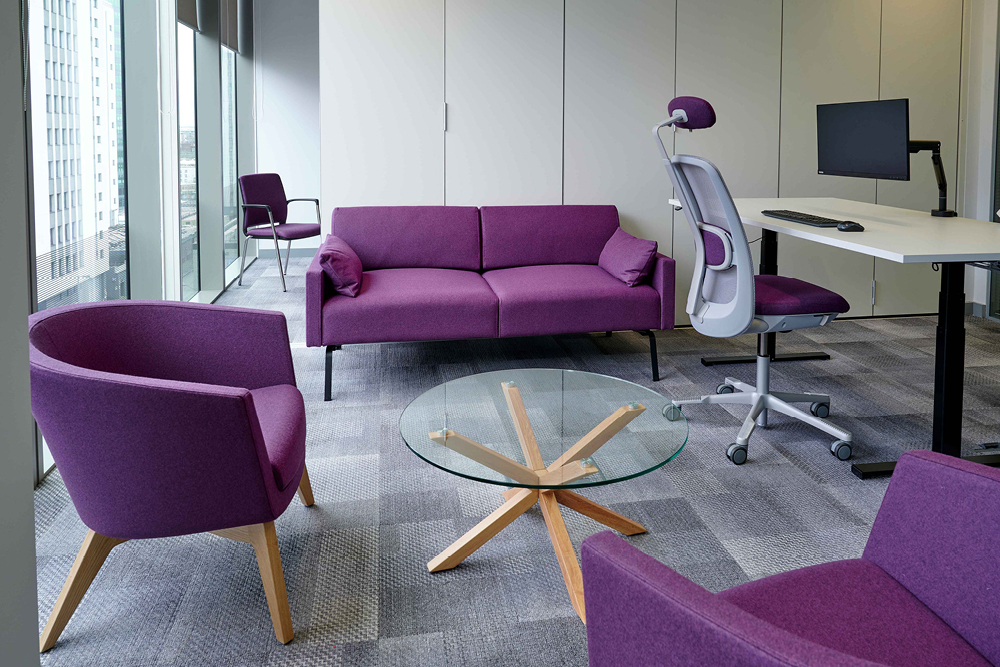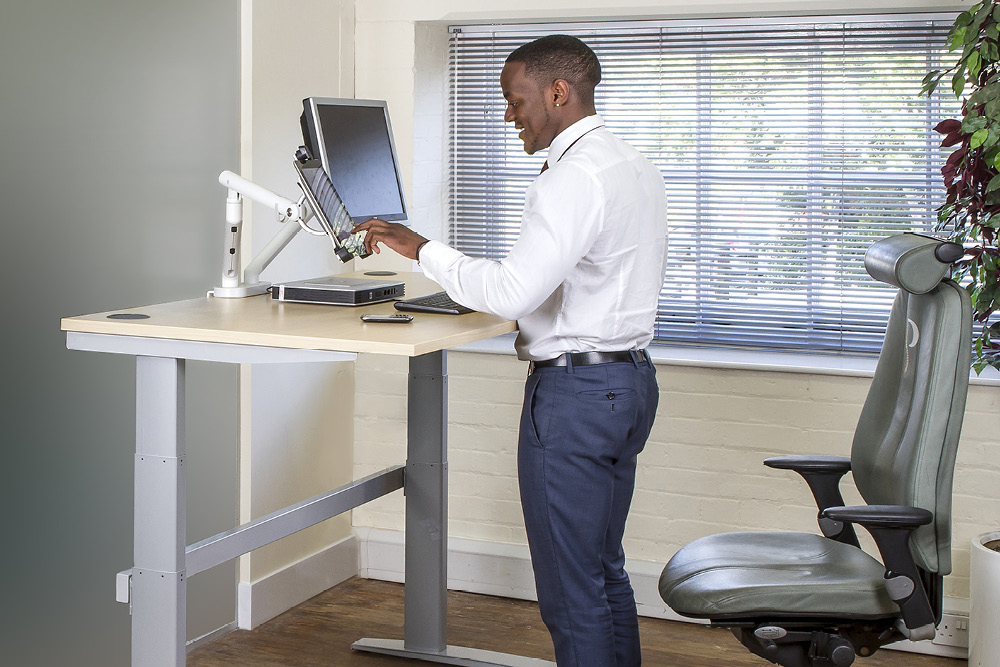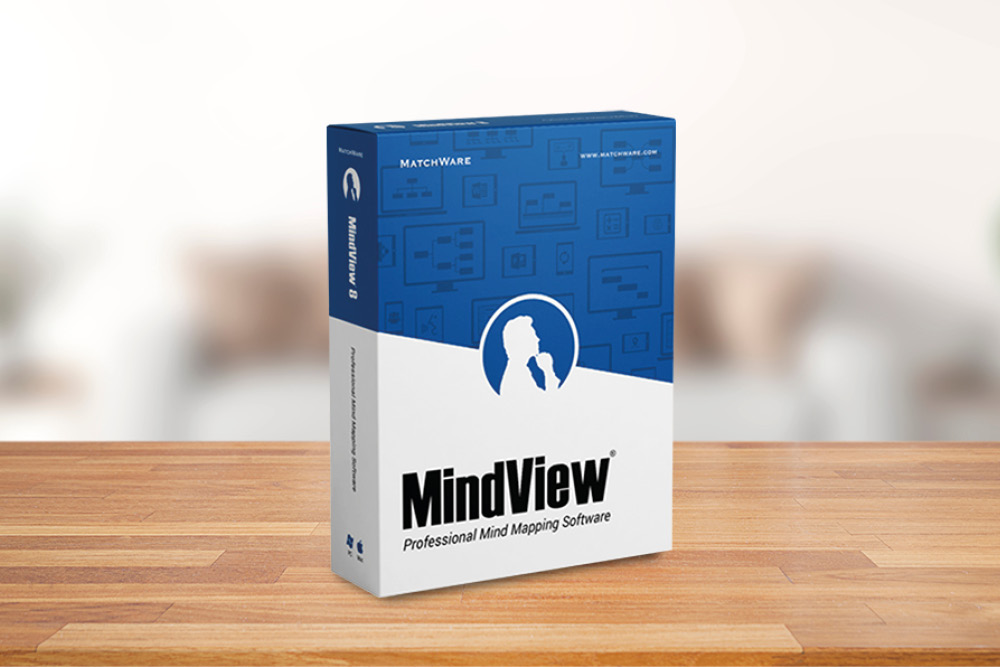To which company would you like to devote the 1,800 hours of your life that you could spend working this year? Who is worthy of your ingenious ideas and red-hot business acumen?
Perhaps organisations such as David Lloyd Leisure, FatFace, Pandora, BrewDog, Chapel Down and OVO Energy are on your employer wishlist because you’ve heard they’ve won The Sunday Times ‘Best Places to Work’ 2023.
In this article I’ll look at employee satisfaction in 2023 and why organisations might be investing time and money in employee wellbeing. Is it actually all PR gloss?
I’ll explore the secrets to the success of the award winners and if there is commonality in their approaches.
What’s the result of a happy workforce?

The CIPD (Chartered Institute of Personnel and Development) says that an integrated approach to employee health and wellbeing can prompt:
- Higher levels of productivity
- Higher levels of engagement
- A good organisational culture
- Employee commitment and loyalty
And of course you want to:
- Stop people leaving their jobs and causing you recruitment expense and hassle (“Employees who aren’t happy represent a measurable ‘flight risk’” says research by WorkL)
- Support people to do their best work
- Reduce sick leave, for mental health and physical health reasons
It’s not news that happy staff can generate prosperity in a business. “Our success is driven by the quality of our employees, and we see this as a two-way relationship” says Chris Jones, MD of Posturite. The energy that you pour into nurturing your staff’s welfare is likely to materialise on your balance sheet. If the relationship between employee and employer is strong, your happy staff will want the best business outcomes, partly because it gives them a feelgood buzz to make a valuable and valued contribution.
Don’t forget that employers have a legal duty to protect the health, safety and welfare of their employees, no matter where they work. They are required to carry out risk assessments to identify potential hazards to you at work and then control the risks identified, and it’s not just physical hazards but mental health and wellbeing issues such as stress too. It’s not sole responsibility – as an employee and individual, you have responsibility for your own health, safety and wellbeing.
How are the winners of The Sunday Times ‘Best Places to Work’ decided?

Detailed staff surveys are used to decide who wins these prestigious employee satisfaction awards. I looked into how these surveys are conducted, and I now feel convinced that the results of The Sunday Times Best Places to Work are fair. Here’s why:
- Companies with 2,000 or more employees must get at least 40% of staff to complete the survey
- Companies with 50-1,999 employees must get at least 50% of staff to complete the survey
- Companies with fewer than 50 employees must get at least 60% of staff to complete the survey
- The survey uses 35 questions developed by psychologists, behavioural scientists, business leaders, data analysts and academics
- To be accredited as a Sunday Times Best Place to Work, companies must achieve an overall engagement score of 70% or more.
This engagement score covers:
- Job Satisfaction
- Reward and Recognition
- Pride
- Information Sharing
- Empowerment
- Wellbeing
Cue Heather Small to sing ‘What have you done today to make you feel proud?’ as pride is a key theme in the staff survey.
Employees answer questions in the survey including ‘My employer cares for my wellbeing’ and ‘I rarely feel anxious or depressed about work’.
Whether you’re an employer who wants to win awards or not, you could use the six elements above to guide you on providing the best work culture that you can. And if your interest is as a member of staff, think through how you would rate those six elements above in your current job – and if there is a key aspect you could resolve by raising it with your managers, or of course moving to a new job.
“I have what I need to do my job well”
Have you ever been to a job interview where the premises look grim? I have – and I haven’t touched that job with a barge pole as for me that’s a clear indicator that the employer doesn’t care about the staff.
As well as the overall pleasantness and cleanliness of the environment, I’m interested in the office furniture and equipment because I need some decent tools to do my best work. It can be off-putting if an office is badly equipped whereas if there’s a range of ergonomic furniture offered, the rooms look attractive and comfortable, the technology seems new and high-functioning, these are important enticements for job hunters.
Ergonomics is not a perk by the way – ergonomic equipment and ensuring staff are supported and know how to use it effectively is integral to a good employer’s health, safety, wellbeing and efficiency strategy. It’s common sense to provide equipment that will help prevent health problems in your workforce (such as musculoskeletal injuries) which will cause your staff misery, absence and poor productivity. Plus encouraging good work habits – such as keeping moving and taking breaks – is the sign of a good employer too.
It’s a win-win for both of you – you’ll enjoy better health and wellbeing and your employer will enjoy your best productivity.
Which employee perks can I expect?
The perks which caught my eye offered by The Sunday Times Best Places to Work award winners were:
- Cheaper electric-vehicle leasing (from CGI)
- Prizes of Raleigh bikes (from FatFace)
- Trips to India to learn about their chosen charity and Indian cuisine (from Mowgli Street Food)
- Office dogs to fuss (this isn’t uncommon but tails.com have 57 registered office dogs!)
- Prosecco on tap in the office (from the7stars)
- Free eyelash technician appointments – really?? (from Hamilton Barnes Associates)
- Free entry to events such as Tough Mudder (from Big Bite Creative)
Fair wages

In this cost of living crisis, the salary is going to be very important. 12,500 UK employers including Posturite are accredited Living Wage Employers who pay the ‘real Living Wage’ rates which are slightly higher than the statutory minimum wages set by government. The rates are independently-calculated based on what people need to get by. Employers are encouraged to ensure their employees earn a wage that meets the costs of living.
Inclusivity and equality at work
A common thread amongst successful companies listed in The Sunday Times ‘Best Places to Work' is their evidence of a culture of inclusivity. Award-winning design and engineering consultancy Arcadis encourage staff to bring their “authentic self” to work and use the hashtag #ProudToBeMe as shorthand for making its 4,536 staffers feel accepted. They have an impressive Diversity, Equity, Inclusion and Belonging Policy stating that all Arcadians’ responsibilities include ‘respecting the dignity and diversity of all individuals’.
The Alzheimer’s Society charity also won the ‘Best Places to Work’ accolade and says it pays equal attention to all of its 1,819 employees. There are weekly meetings with their chief executive Kate Lee and a women in leadership development programme.
For staff wellbeing, it’s important and the law to offer reasonable adjustments to working practices to anyone whose condition fulfils the requirements of the Equality Act. An employee perhaps has dyslexia, ADHD, limited mobility or hearing loss for example. There is often specialised equipment and Assistive Technology to completely transform an individual’s experience of work and this can be recommended in a Workplace Needs Assessment carried out by experts such as Posturite. It’s important to remember that removing barriers helps us all to work better.
Flexibility in where and when we work
Is it purely an accident that so many of the award winners mentioned hybrid working or even four day week working?
I think not.
“At these Best Places to Work, progressive workplace practices are hardwired” says renowned businesswoman Martha Lane Fox. “Whether working from hybrid locations or within flexible timeframes, enjoying high levels of employee wellbeing, thoughtful perks or beneficial training, staff at these companies are enjoying the best of British business.”
Glassdoor carried out research into the employee satisfaction at companies which have mandated full returns to the office. The results vary in fact – one company had only 36% of staff who would recommend working there to a friend, whereas another office-only employer achieved a 87% recommend-to-a-friend rating.
Who else is measuring employee wellbeing?
It’s fascinating to see the happiness at work debate continue and our expectations evolve. And if your job fills you with dread or apprehension, I’d urge you to make a change. Our mental health is precious:
“There is no work/life; there is only life. Your work will be a substantial part of your life and the good news is that it can be truly meaningful. Your work can be a true driver for a fulfilling, high-quality life.” Bruno Delepierre, Happonomy
Read next:














